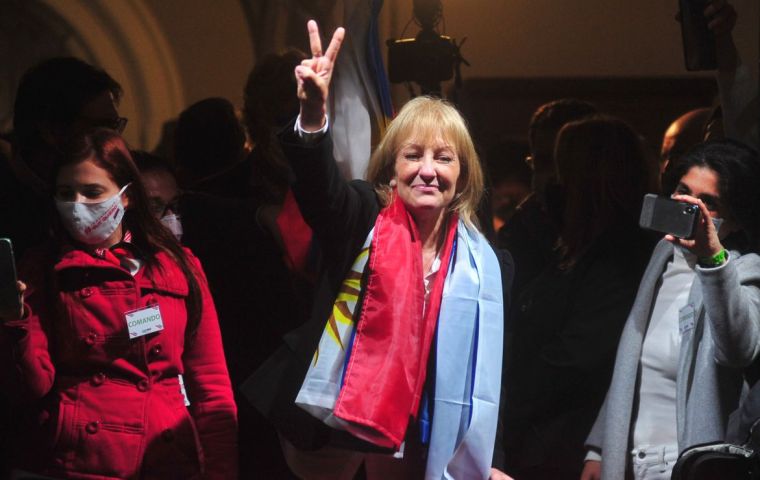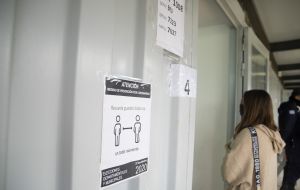MercoPress. South Atlantic News Agency
Municipal election in Uruguay: a woman the next mayor of Montevideo and an estimated 90% voters turnout
 Carolina Cosse, addressing her followers as confirmed next mayor of Montevideo
Carolina Cosse, addressing her followers as confirmed next mayor of Montevideo  Sunday's county and municipal elections in Uruguay took place under adverse climate conditions and strict sanitary protocol, to avoid the spread of the pandemic. Photo: Sebastián Astorga
Sunday's county and municipal elections in Uruguay took place under adverse climate conditions and strict sanitary protocol, to avoid the spread of the pandemic. Photo: Sebastián Astorga The next mayor of Uruguay's capital is a woman, Carolina Cosse, an electronics engineer, who has worked in the private sector and more recently in government as head of Uruguay's telecom company and minister of industry.
Sunday's county and municipal elections in Uruguay took place under adverse climate conditions and strict sanitary protocol, to avoid the spread of the pandemic which forced the suspension of the event originally scheduled for May to September.
Nevertheless an estimated 90% of registered electors attended polling stations, according to primary data from the Electoral Court.
Cosse, 59, was elected from one of three candidates of the opposition catch all coalition, Broad Front which until last March had ruled Uruguay for three consecutive mandates, that is fifteen years, and has had control of the capital's town hall since 1990, or thirty years.
Even when the three candidates of the Broad Front obtained 51% of the overall vote, Cosse managed 21% and her two same party rivals Alvaro Villar, a neurologist 18% and Daniel Martinez an engineer and former mayor of Montevideo, 12%.
Meanwhile the single candidate for the ruling coalition of five parties, Laura Raffo, an economist received 40% of votes cast, which can be considered impressive for a first time hopeful.
However Montevideo – that represents the half (1.4 mills.) of the national population, 3.4 million inhabitants – in the last forty years has shown to have a solid 35/40% vote which rejects point blank any Broad Front coalition candidate, since they include, Communists, Socialists, Social Democrats, Radicals and ex guerrillas turned politicians under ex president Jose Mujica.
Nevertheless in good Uruguayan political tradition, Ms Raffo called Ms Cosse to congratulate her on victory, and so did the Uruguayan president and vice president, Luis Lacalle Pou and Beatriz Argimón.
As to the rest of the eighteen county circumscriptions, the senior partner of the ruling coalition, the National Party to which president Lacalle Pou belongs, won fifteen, junior coalition partner Partido Colorado, one and the Broad Front retained two, Canelones, which to a significant extension has become part of metropolitan Montevideo, and Salto in the northwest.
Despite having the support of some of the more radical groups in the Broad Front, Ms. Cosse in her victory speech called for party unity and above all “respect”. When she revealed that her main competitor had congratulated her, as well as the president and vice president, Cosse called on her followers, please no booing, please respect.
Having been elected mayor of Montevideo, political history in Uruguay indicates that if Cosse manages a good performance as administrator, it could be the springboard for an attempt on the presidency in 2024.




Top Comments
Disclaimer & comment rulesCommenting for this story is now closed.
If you have a Facebook account, become a fan and comment on our Facebook Page!